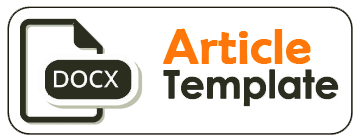The Correlation Between Reading Ability And Self-Regulated Reading in Digital Text
DOI:
https://doi.org/10.32528/ellite.v9i1.2502Keywords:
Self-regulated reading, Digital text, English Preservice teachersAbstract
The research aims to investigate two main questions: first, whether there exists a correlation between the extensive use of self-regulated reading and the reading proficiency of aspiring English teachers, particularly in digital text comprehension; second, which specific components of self-regulated reading are predominantly employed by these preservice English teachers. The research adopts a quantitative approach, employing a correlational study design, with 37 sixth-semester students in English language education as participants. Data collection involves using a questionnaire and gathering participants' reading scores. The analysis is conducted using correlation and descriptive statistics in Microsoft Excel. Results indicate a weak negative correlation of -0.02116, suggesting a discrepancy between student's reading abilities and their reported self-regulated reading habits in online texts. In conclusion, there is a minimal negative association between students' reading proficiency and online reading proficiency. Future research should delve deeper into this relationship, incorporating specific assessments of online reading proficiency. Furthermore, researchers can also consider additional variables, such as students' level of technological skills or preferences for digital learning, to enrich the understanding of the dynamics of the interaction between reading ability and self-regulated reading in the context of online text.
References
Amini, D., Anhari, M. H., & Ghasemzadeh, A. (2020). Modeling the relationship between metacognitive strategy awareness, self-regulation and reading proficiency of Iranian EFL learners. Cogent Education, 7(1). https://doi.org/10.1080/2331186X.2020.1787018
Ary, D., Jacobs, L. C., Sorensen, C., & Razavieh, A. (2010). Introduction to Research in Education (8th ed.). WADSWAPRTH CANGAGE Learning.
Brun-mercer, N. (2019). Online Reading Strategies for the Classroom. English Teaching Forum, 57(4), 2–11. https://americanenglish.state.gov/files/ae/resource_files/etf_57_4_pg2-11.pdf
Cho, B.-Y. (2014). Competent Adolescent Readers’ Use of Internet Reading Strategies: A Think-Aloud Study. Cognition and Instruction, 32(3), 253–289. https://doi.org/10.1080/07370008.2014.918133
Cho, B.-Y., & Afflerbach, P. (2017). An Evolving Perspective of Constructively Responsive Reading Comprehension Strategies in Multilayered Digital Text Environments. In E. Susan (Ed.), Handbook of Research on Reading Comprehension (Issue January, pp. 1–28). Guilford Publications. https://www.researchgate.net/publication/317021664
Chou, M. H. (2013). Strategy use for reading english for general and specific academic purposes in testing and nontesting contexts. Reading Research Quarterly, 48(2), 175–197. https://doi.org/10.1002/rrq.42
Delgado, P., & Salmerón, L. (2022). Cognitive Effort in Text Processing and Reading Comprehension in Print and on Tablet: An Eye-Tracking Study. Discourse Processes, 59(4), 237–274. https://doi.org/10.1080/0163853X.2022.2030157
Gilbert, J. (2017). A Study of ESL Students’ Perceptions of Their Digital Reading. An International Journal Online, 17(2), 179–195. https://readingmatrix.com/files/17-z2d49xa9.pdf
Harding, S., English, N., Griffin, P., & Graham, L. (2019). Self-regulated learning as a predictor of mathematics and reading performance : A picture of students in Grades 5 to 8. Australian Journal of Education, 63(1), 74–97. https://doi.org/10.1177/0004944119830153
Hemmati, F., Sotoudehnama, E., & Morshedian, M. (2018). The Impact of Teaching Self-regulation in Reading on EFL Learners ’ Motivation to Read : Insights from an SRL Model. Journal of Modern Research in Engish Language Studies, 5(4), 131–155. https://doi.org/10.30479/jmrels.2019.10583.1325
Ho, K. L. E. S. (2016). Reading Performance and Self-regulated Learning of Hong Kong Students : What We Learnt from PISA 2009. The Asia-Pacific Education Researcher, 25(1), 159–171. https://doi.org/10.1007/s40299-015-0246-1
Hu, J., & Gao, X. (Andy). (2017). Using think-aloud protocol in self-regulated reading research. Educational Research Review, 22, 181–193. https://doi.org/10.1016/j.edurev.2017.09.004
Kung, F. W. (2017). Teaching second language reading comprehension: the effects of classroom materials and reading strategy use. Innovation in Language Learning and Teaching, 13(1), 93–104. https://doi.org/10.1080/17501229.2017.1364252
Laeli, A. F., Setiawan, S., & Anam, S. (2022). EFL Pre-service Teachers’ Online Reading Strategy Use and their Insight into Teaching Reading. International Journal of Learning, Teaching and Educational Research, 21(10), 139–160. https://doi.org/10.26803/ijlter.21.10.7
Leu, D. J., Everett-Cacopardo, H., Zawilinski, L., Mcverry, J. G., & O ’byrne, A. W. I. (2012). New Literacies of Online Reading Comprehension. The Encyclopedia Of Applied LInguistics, 1–9. https://doi.org/10.1002/9781405198431.wbeal0865
Li, J. (2020). Development and validation of Second Language Online Reading Strategies Inventory. Computers and Education, 145, 103733. https://doi.org/10.1016/j.compedu.2019.103733
Mardani, N. H., & Afghary, A. (2017). Self-Regulated Strategy Development ( SRSD ) and the Reading Process : Effects on Reading and Metacognitive Awareness. 4(6), 192–200.
Oxford, R. L. (2017). Teaching and Researching Language Learning Strategies; Self-Regulation in Context (Second Edi). Routledge Taylor & Francis Group.
Ping, A. M. (2012). Understanding self-regulated learning and its implications for strategy instruction in language education. The Journal of Language Learning and Teaching, 2(2), 89–104.
Pintrich, P. R., Smith, D. A. F., Garcia, T., & Mckeachie, W. J. (1993). Reliability and Predictive Validity of the Motivated Strategies for Learning Questionnaire (Mslq). Educational and Psychological Measurement, 53(3), 801–813. https://doi.org/10.1177/0013164493053003024
Qi, X. (2021). Effects of Self-Regulated Learning on Student ’ s Reading Literacy : Evidence From Shanghai Chinese Students in Terms of. Frontiers in Psychology, 11(January). https://doi.org/10.3389/fpsyg.2020.555849
Sashikala, J. P., & Chye, S. Y. L. (2023). Self-Regulated Reading: Insights from a Phenomenological Study of Primary 6 Students in Singapore. Reading Psychology, 44(3), 270–305. https://doi.org/10.1080/02702711.2022.2141402
Seok, S., & DaCosta, B. (2016). Perceptions and preferences of digital and printed text and their role in predicting digital literacy. Asian Social Science, 12(5), 14–23. https://doi.org/10.5539/ass.v12n5p14
Song, K., Na, B., & Kwon, H. J. (2020). A comprehensive review of research on reading comprehension strategies of learners reading in English-as-an-additional language. Educational Research Review, 29, 100308. https://doi.org/10.1016/j.edurev.2019.100308
Teng. (2019). The benefits of metacognitive reading strategy awareness instruction for young learners of English as a second language. Literacy, 54(1), 29–39. https://doi.org/10.1111/lit.12181
Thiede, K. W., & de Bruin, A. B. H. (2018). Self-Regulated Learning in Reading. In D. H. Schunk & J. A. Greene (Eds.), Handbook of Self-Regulation of Learning and Performance (Second, pp. 116–128). Routledge. https://doi.org/10.4324/9780203839010
Xu, Z., Zhao, Y., Liew, J., Zhou, X., & Kogut, A. (2023). Synthesizing research evidence on self-regulated learning and academic achievement in online and blended learning environments: A scoping review. Educational Research Review, 39(October 2020), 100510. https://doi.org/10.1016/j.edurev.2023.100510
Zimmerman, B. J. (2002). Becoming a Self-Regulated Learner: An Overview. Theory Into Practice, 41(2), 64–70. https://doi.org/10.1207/s15430421tip4102
Downloads
Published
Issue
Section
License
Copyright (c) 2024 Anita Laeli

This work is licensed under a Creative Commons Attribution 4.0 International License.






